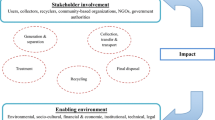Abstract
Implementation of waste-to-energy (WtE) incineration has recently surged in developing countries, but the drivers of this growth and the constraints on WtE project sustainability in local contexts remain incompletely understood. We aimed to identify these drivers and constraints in developing countries using Hanoi Capital, Vietnam, as a case study. Face-to-face interviews and a field survey were employed to investigate stakeholders’ opinions and consolidate WtE-related information to identify drivers. The main drivers were the current limited treatment capability, local opposition to current strategies, introduction of legislative incentives and landfilling restrictions, the Hanoi government’s involvement, the example set by the existing WtE plant in Can Tho, increasing waste generation with increasing land scarcity, competitive tipping fees, and introduction of a public–private-partnership model. Some of these identified drivers eliminated historical Vietnamese WtE barriers. Constraints were determined by evaluating the interview results and local data from the field survey. These constraints had legal aspects (e.g., overlapping agency responsibilities), as well as financial (e.g., low tipping fees), technical/technological (e.g., unsorted waste), environmental (e.g., lack of stringent flue gas controls), and social (public opposition to plants) aspects. The evidence presented here could help secure waste treatment capacity through sustainable WtE incineration in other fast-growing cities.



Similar content being viewed by others
References
GIZ (2017) Waste-to-Energy options in municipal solid waste management- A guide for decision makers in developing and emerging countries https://repository.publisso.de/resource/frl:6403287/data Accessed 8 July 2019
World Energy Council (2013) Chapter 7b: Waste-to-energy. In: World Energy Resources: 2013 survey https://www.worldenergy.org/assets/images/imported/2013/10/WER_2013_7b_Waste_to_Energy.pdf Accessed 2 May 2019
Sharma A, Ganguly R, Gupta AK (2019) Characterization and energy generation potential of municipal solid waste from nonengineered landfill sites in Himachal Pradesh, India. J Hazard Toxic Radioact Waste 23:04019008. https://doi.org/10.1061/(ASCE)HZ.2153-5515.0000442
Pariatamby A, Tanaka M (2014) Municipal solid waste management in Asia and Pacific Islands: Challenges and strategic solutions. Springer , Singapore
Makarichi L, Jutidamrongphan W, Techato K (2018) The evolution of waste-to-energy incineration: A review. Renew Sustain Energy Rev 91:812–821
Agamuthu P, Khidzir KM, Hamid FS (2009) Drivers of sustainable waste management in Asia. Waste Manag Res 27:625–633
World Bank (1999) Decision makers’ guide to municipal solid waste incineration. Washington, D.C http://web.mit.edu/urbanupgrading/urbanenvironment/resources/references/pdfs/DecisionMakers.pdf Accessed 20 October 2019
MONRE (2020) National Environment Report 2019 http://www.monre.gov.vn/Portal/Documents/2020/11/Ban%20Giay%20phep%20in_Bao%20cao%20hien%20trang%20moi%20truong%20%281%29.pdf Accessed 15 April 2020
CESTI- HCMC DOST (2016) Technology trend analysis-Theme: Waste-to-energy technology https://dost.hochiminhcity.gov.vn/documents/562/201707260206297918Tongquan_Ky_4_-_Xu_huong_dot_chat_thai_phat_dien.pdf Accessed 24 March 2020
MONRE (2017) National Environment Report 2017 http://vea.gov.vn/Documents/bao%20cao%20moi%20truong%20quoc%20gia/bao%20cao%20moi%20truong%202017-danen.pdf?csf=1&e=GcRbRt%20 Accessed 7 October 2019
UNEP (2019) Waste-to-Energy: Considerations for Informed decision-making https://www.unep.org/ietc/resources/publication/waste-energy-considerations-informed-decision-making Accessed 18 February 2020
ISWA (2013) ISWA guidelines: Waste-to-energy in low- and middle-income countries. Austria https://www.iswa.org/index.php?eID=tx_bee4mecalendar_download&eventUid=243&filetype=public&filenum=2 Accessed 17 October 2019
GSO (2020) Statistical Yearbook of Vietnam 2019. Statistical Publishing House, Hanoi
URENCO (2014) Solid waste management in Hanoi Capital http://wadassdi.web.fc2.com/vwp/ws1/5pham_en.pdf Accessed 24 December 2019
Prime Minister (2018) Decision No.491/QD-TTg on the revised National strategy on integrated solid waste management to 2025, with a vision to 2050
MOC, JICA (2018) Overview of solid waste in Vietnam. Hanoi
Prime Minister (2014) Decision No.609/QD-TTg on Approving the Master Plan on Solid Waste Disposal of Hanoi Capital to 2030, with a vision to 2050
MONRE (2019) Decision No.1324/QD-BTNMT on approving the EIA report of Waste-to-electricity plant in Soc Son
MONRE (2017) Decision No. 1546/QD-BTNMT on approving the EIA report of MSW treatment plant in Can Tho
Hanoi PC (2020) Decision No.1837/QD-UBND on the revised master plan of waste treatment complex of Soc Son phase II and revised layout of WtE project in Soc Son
Prime Minister (2015) Decree No. 18/2015/ND-CP Regulations on environmental planning, SEA, EIA and environmental protection plan
Prime Minister (2014) Decision No.31/2014/QD-TTg on support mechanism for the development of power generation projects using solid waste(s) in Vietnam
MOIT (2015) Circular No.32/2015/TT-BCT on Project development and Standardized Power Purchase Agreement for power generation projects using solid wastes
EverBright Energy and Environment Ltd. Co. (2017) Report on Environmental Impact Assessment of project “Solid waste (domestic waste) treatment plant of Can Tho.” Can Tho
Kawai K, Huong LTM, Yamada M, Osako M (2016) Proximate composition of household waste and applicability of waste management technologies by source separation in Hanoi, Vietnam. J Mater Cycles Waste Manag 18:517–526. https://doi.org/10.1007/s10163-014-0348-5
Acknowledgements
The authors thank the interviewees from the Ministry of Natural Resources and Environment, Ministry of Construction, and Department of Construction of Can Tho, as well as the interviewee involved in the Waste-to-Energy business and the Japanese expert in Vietnamese MSW management, for their valuable opinions and sharing. We sincerely thank the staff of the EverBright Waste-to-Energy plant in Can Tho for practical information and support during the field survey. Last but not least, we are grateful to the anonymous reviewers for their very constructive comments that have greatly helped to improve our paper. Exchange rate: USD 1 = VND 23,000.
Author information
Authors and Affiliations
Corresponding author
Additional information
Publisher's Note
Springer Nature remains neutral with regard to jurisdictional claims in published maps and institutional affiliations.
Supplementary Information
Below is the link to the electronic supplementary material.
Rights and permissions
About this article
Cite this article
Nguyen, T.D., Kawai, K. & Nakakubo, T. Drivers and constraints of waste-to-energy incineration for sustainable municipal solid waste management in developing countries. J Mater Cycles Waste Manag 23, 1688–1697 (2021). https://doi.org/10.1007/s10163-021-01227-2
Received:
Accepted:
Published:
Issue Date:
DOI: https://doi.org/10.1007/s10163-021-01227-2




